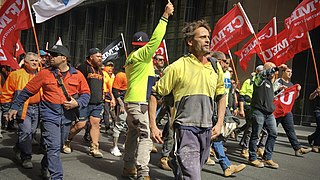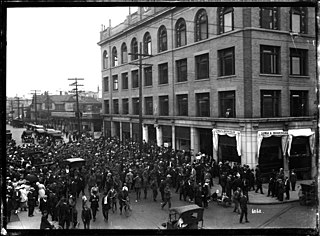A trade union or labor union, often simply referred to as a union, is an organisation of workers intent on "maintaining or improving the conditions of their employment", such as attaining better wages and benefits, improving working conditions, improving safety standards, establishing complaint procedures, developing rules governing status of employees and protecting and increasing the bargaining power of workers.

Strike action, also called labor strike, labour strike, or simply strike, is a work stoppage caused by the mass refusal of employees to work. A strike usually takes place in response to employee grievances. Strikes became common during the Industrial Revolution, when mass labor became important in factories and mines. As striking became a more common practice, governments were often pushed to act. When government intervention occurred, it was rarely neutral or amicable. Early strikes were often deemed unlawful conspiracies or anti-competitive cartel action and many were subject to massive legal repression by state police, federal military power, and federal courts. Many Western nations legalized striking under certain conditions in the late 19th and early 20th centuries.
Collective bargaining is a process of negotiation between employers and a group of employees aimed at agreements to regulate working salaries, working conditions, benefits, and other aspects of workers' compensation and rights for workers. The interests of the employees are commonly presented by representatives of a trade union to which the employees belong. The collective agreements reached by these negotiations usually set out wage scales, working hours, training, health and safety, overtime, grievance mechanisms, and rights to participate in workplace or company affairs. Such agreements can include 'productivity bargaining' in which workers agree changes to working practices in return for higher pay or greater job security.
In British politics, an affiliated trade union is one that is linked to the Labour Party. The party was created by the trade unions and socialist societies in 1900 as the Labour Representation Committee and the unions have retained close institutional links with it.

United Kingdom labour law regulates the relations between workers, employers and trade unions. People at work in the UK can rely upon a minimum set of employment rights, which are found in Acts of Parliament, Regulations, common law and equity. This includes the right to a minimum wage of £9.50 for over-23-year-olds from April 2022 under the National Minimum Wage Act 1998. The Working Time Regulations 1998 give the right to 28 days paid holidays, breaks from work, and attempt to limit long working hours. The Employment Rights Act 1996 gives the right to leave for child care, and the right to request flexible working patterns. The Pensions Act 2008 gives the right to be automatically enrolled in a basic occupational pension, whose funds must be protected according to the Pensions Act 1995.

The Canadian Labour Congress, or CLC is a national trade union centre, the central labour body in Canada to which most Canadian labour unions are affiliated.
Trade unions in Malaysia are regulated by the Trade Unions Act of 1959.

Union busting is a range of activities undertaken to disrupt or prevent the formation of trade unions or their attempts to grow their membership in a workplace.

The Trade Union and Labour Relations (Consolidation) Act 1992 is a UK Act of Parliament which regulates United Kingdom labour law. The Act applies in full in England and Wales and in Scotland, and partially in Northern Ireland.
Trade unions in Ghana first emerged in the 1920s and played an important role in the country's economy and politics ever since.

Labor relations is a field of study that can have different meanings depending on the context in which it is used. In an international context, it is a subfield of labor history that studies the human relations with regard to work in its broadest sense and how this connects to questions of social inequality. It explicitly encompasses unregulated, historical, and non-Western forms of labor. Here, labor relations define "for or with whom one works and under what rules. These rules determine the type of work, type and amount of remuneration, working hours, degrees of physical and psychological strain, as well as the degree of freedom and autonomy associated with the work." More specifically in a North American and strictly modern context, labor relations is the study and practice of managing unionized employment situations. In academia, labor relations is frequently a sub-area within industrial relations, though scholars from many disciplines including economics, sociology, history, law, and political science also study labor unions and labor movements. In practice, labor relations is frequently a subarea within human resource management. Courses in labor relations typically cover labor history, labor law, union organizing, bargaining, contract administration, and important contemporary topics.
A collective agreement, collective labour agreement (CLA) or collective bargaining agreement (CBA) is a written contract negotiated through collective bargaining for employees by one or more trade unions with the management of a company that regulates the terms and conditions of employees at work. This includes regulating the wages, benefits, and duties of the employees and the duties and responsibilities of the employer or employers and often includes rules for a dispute resolution process.
The National Federation of SubPostmasters (NFSP) is a membership organisation, which represents subpostmasters in the United Kingdom and currently has more than 8,000 members who operate approximately 9,300 post office branches. Post Office Ltd is contractually obliged to consult the NFSP on behalf of subpostmasters.
European labour law regulates basic transnational standards of employment and partnership at work in the European Union and countries adhering to the European Convention on Human Rights. In setting regulatory floors to competition for job-creating investment within the Union, and in promoting a degree of employee consultation in the workplace, European labour law is viewed as a pillar of the "European social model". Despite wide variation in employment protection and related welfare provision between member states, a contrast is typically drawn with conditions in the United States.

Demir and Baykara v Turkey [2008] ECHR 1345 is a landmark European Court of Human Rights case concerning Article 11 ECHR and the right to engage in collective bargaining. It affirmed the fundamental right of workers to engage in collective bargaining and take collective action to achieve that end.

Wilson v United Kingdom [2002] ECHR 552 is a United Kingdom labour law and European labour law case concerning discrimination by employers against their workers who join and take action through trade unions. After a long series of appeals through the UK court system, the European Court of Human Rights held that ECHR article 11 protects the fundamental right of people to join a trade union, engage in union related activities and take action as a last resort to protect their interests.
The National Union of Gold, Silver and Allied Trades (NUGSAT) was a trade union in Britain and Ireland. It represented workers in precious metals, jewellers, diamond polishers, electroplaters, watch and clock repairers and dental technicians.
Fullarton Computer Industries Ltd v Central Arbitration Committee [2001] Scot CS 168 is a UK labour law case, concerning collective bargaining.

R v Central Arbitration Committee[2005] EWCA Civ 1309 is a UK labour law case, concerning collective bargaining.

Kostal UK Ltd v Dunkley [2021] UKSC 47 is a UK labour law case, concerning the right to suffer no detriment for joining, or inducements to not join, a trade union.










